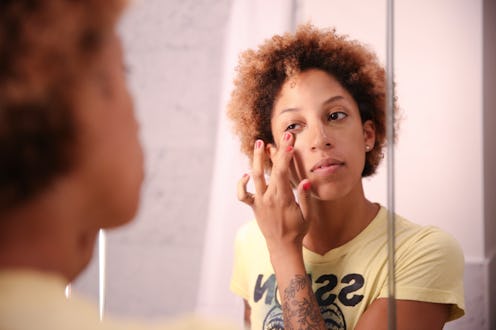Fashion
Here's Why You Shouldn't Use Anti-Aging Products

We always hear that the best way to combat the signs of aging are by starting early with preventative measures and taking care of our skin, but is there such a thing as too soon? If you're in your 20s and thinking about starting with the anti-wrinkle creams and serums, you might be wondering: Should you use anti-aging products in your 20s? I went straight to an expert to find out, and you might be surprised that your good intentions are causing some unwanted side effects.
The day I turned 25, things got real. I am, in every sense of the word, an adult, and that means far more than the ability to legally rent a car. Thirty is now closer than ever, so I decided it was time to get serious about an anti-aging routine. I diligently bought and applied the creams formulated for fine lines and wrinkles, and it was all fine and dandy — until I started breaking out. I don't normally get pimples, not even on my period really, so I was completely taken aback when my face was erupting with zits. I immediately attributed it to my new creams, stopped using them immediately, and went back to my regular old, drugstore moisturizer. Whatever, aging.
But I wanted to get the facts from an expert and find out what gives, and when I should start up again, so I interviewed dermatologist Dr. Jessica Weiser from New York Dermatology Group to find out the details on when you should start anti-aging products, and if your 20s are just too soon.
1. Your 20s Can Be Too Young
In general (emphasis on the general), you don't need to start anti-aging products in your 20s, and it can actually be too young. "The problem with many anti-aging products is that they are formulated for older patients," Weiser tells me.
2. Anti-Aging Creams Can Cause Breakouts
I wasn't drawing false conclusions — these creams can break you out if you start them too young, because the products are formulated for older patients. "As the skin ages, oil production typically wanes, leading to dry skin and therefore requiring richer, heavier creams to alleviate this dryness. Many of these heavy creams can cause occlusion (clogging) of young skin which has more natural oil production," Weiser says.
3. When You Start Depends On The Person
But that's not to say you shouldn't start in your 20s. An average twenty-something probably doesn't need to, but if you grew up at the beach, played sports outside, or spent a lot of time in the sun/tanning, you may need to start sooner than others to combat sun damage and to prevent accelerated aging. "Also, some people are not as genetically gifted as others, and thus will exhibit earlier signs of aging, for example those with dramatic facial expression and strong facial muscles."
4. Your Routine Should Depend On Your Skin Needs
Amara Organics Retinol Cream, $20, Amazon
Choose your products depending on what your skin actually needs, not what ads tell you in the media. "For early wrinkling and skin laxity, I recommend including a retinol-based product to maintain and stimulate collagen production in the skin. For sun-damaged skin, antioxidant-rich products whether serums, oils, or creams are a great way to reverse signs of sun related skin damage," Weiser said.
5. Sun Protection & Hydration Are Key In Your 20s
Arcona Basic Five Normal Skin Type Package, $234, Acrona
For an average twenty-something, instead of trying to fight lines and wrinkles that aren't there, focus on protecting yourself from sun damage and keeping your skin hydrated. "The important elements of skin care should be liberal sun protection, appropriate hydration, and the addition of either antioxidants or retinol as a preventive measure. Often a light serum can keep the skin bright, fresh, and youthful without going overboard," says Weiser.
Want more beauty tips? Check out the video below, and be sure to subscribe to Bustle’s YouTube page for more hacks and tricks!
Images: Isla Murray/Bustle; Amazon; Arcona; Getty Images